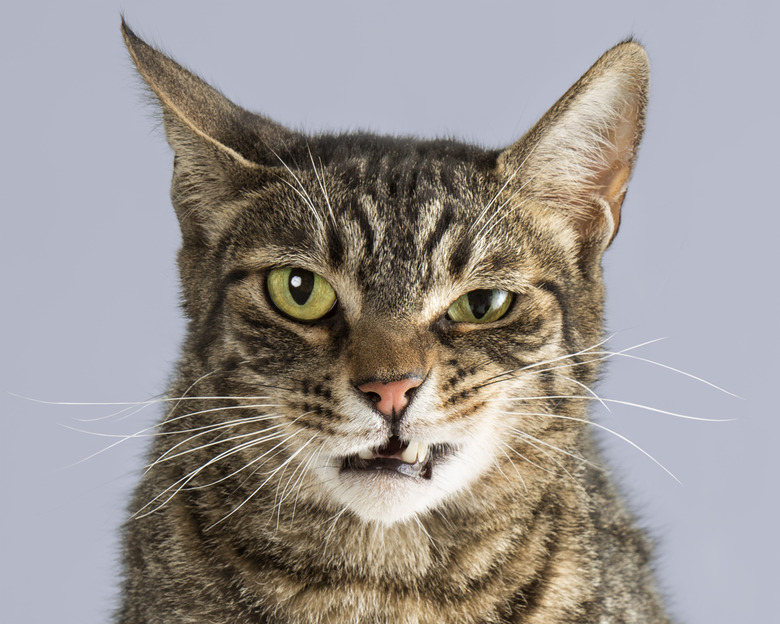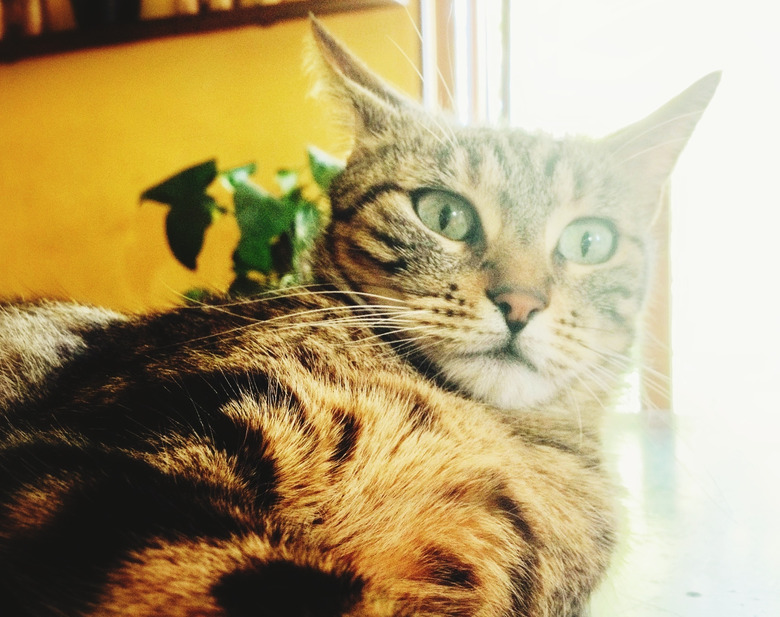How Your Cat's Behavior Changes With Age
Just like people, dogs and cats change as they get older. If you've noticed that your cat has started to act differently since she matured from a kitten to an adult cat, you're not imagining anything: This just a normal part of growing up. Cats' behavior continues to change throughout their life as they age. Here's how you can expect your cat's behavior to change over time.
How your cat's behavior may change with age.
How your cat's behavior may change with age.
Just like humans, cats change as they get older. While kittens are often manic little balls of energy, rage and destruction, older cats are calmer and more content to lay in window sills and soak up the sun.
As cat's mature from adulthood into senior status and beyond, they may exhibit some or all of these common behavioral indicators of aging.
- Unusual sleep-wake cycle
- More vocal
- Needy or demanding behavior
- Easily confused
- Incontinent
- Lethargic
- Irritable
- Aggressive
- Withdrawn
With age, many cats will undergo a change in their sleep schedule. Kittens learn to mirror their humans' activity patterns, and this sleep-wake cycle continues on through cats' adult years. Older cats might start to stay up all night and sleep all day. If this happens, try coaxing your cat back toward a more tolerable schedule by wearing it out with play and attention just before bed.
RELATED: Expect These Changes as Your Cat Becomes a Senior
Senior cats may also be more prone to aggression. This isn't because they're becoming meaner with age, necessarily. As cats enter their senior years, their eyesight and hearing deteriorate. Their senses simply do not perceive as much as they used to, and they're easily caught off guard and react accordingly. Don't take it personally, just try to make sure that you approach with caution and give your cat plenty of time to react to changes in its environment.
Unfortunately, older cats might also have more accidents in the house. As they age, cats can lose some of their ability to control their bowels and bladder, which can lead to more out-of-the-box bathroom breaks. If this starts to happen, consider investing in extra litter boxes to make sure that your cat is always close to an appropriate place to go if the urge strikes.
Older cats may suffer from feline cognitive dysfunction.
Older cats may suffer from feline cognitive dysfunction.
Feline cognitive dysfunction (FCD) is a condition that cat-owners should be aware of as their furry friends age. The condition affects more than 55 percent of cats 11-15 years old and more than 80 percent of cats who are 16-20 years old, according to the pets section of WebMD. Cats affected with FCD might experience a range of symptoms including memory loss, decreased cognitive abilities, and sight and hearing problems.
THE BASICS: Caring for Senior Cats
Other behavioral changes associated with FCD include confusion and disorientation, increased vocalization, and increased pacing. These side effects come along with the cognitive decline that cats experience during FCD. However, it's worth noting that there are other potential causes of all of these symptoms and it's important to talk to your vet to rule out other causes before your chalk changes up to old age or the onset or FCD.
Cat behavior by age
Cat behavior by age
As your cat passes each stage of life, expect signs of aging to increase, and energy levels to decrease.
Kitten (0-6 months): Your cat is full kitten, not sexually mature, and trying to process the massive amounts of information he's taking in about the world. It's a lot to deal with. All your kitten seems to want to do is play.
Teen (6-12 months): The terrible "teens" of cat-hood. During this stage, your kitten is a full on nightmare, mouthing and grabbing at everything he can, challenging the humans in the house for dominance, and generally trying to show everyone he's the boss of everything (an attitude he will probably maintain throughout his life, regardless of how dominant he proves to be).
Adult (1-2 years): By one, your cat is entering adulthood and developing all kinds of lifelong cat behaviors, like kneading, hissing, and hiding. He's calming down a little from his full-on kitten stage, but he's still got plenty of energy. He's learning a lot right now and settling into his cat life.
Prime maturity (3-6 years): From ages 3-6, your cat is in his prime. He's learned the basics of catting and he's settled into the personality and energy level that feel right for him.
Middle age (7-10 years): At this point, your cat has entered the kitty equivalent of middle age. He's still got energy, but not quite as much as he did in his prime. You may notice that your cat starts to become particularly set in his ways—he might be much more resistant to any changes and might experience anxiety more often than he did in the past.
Senior (11-14 years): Now, your cat is officially a senior citizen. He will likely start to experience a decline in health, including deteriorating vision and hearing and possible cognitive decline. Like older humans, your cat might be prone to "grumpiness," and you might notice he gets irritated more easily than he used to.
Geriatric (15+ years): After 15, cats are categorized as geriatric and need a lot more attention. Any behavioral changes will warrant a vet trip at this point and you can expect extreme lethargy and lots of naps.
What is considered old age for cats?
What is considered old age for cats?
Around age 11, cats enter what is considered the senior stage of their lives. From 11-14, cats are comparable to humans in their 60s and 70s. Although cats become "old" at around 11 years old, they don't become officially geriatric until the ripe old age of 15. At this point, they're comparable to humans in their 80s. Many cats live to be geriatric and not all experience extreme health issues. It's important to keep an eye out for changes and discuss them with your vet, especially with geriatric cats.
CAT AGE CHART: How to Convert Cat Years Into Human Years
How old age affects your cat's behavior.
How old age affects your cat's behavior.
Old age impacts cat behavior in much the same way it impacts humans. Older cats are likely to have less energy (which translates to even more napping and lounging about than they did in their prime). They're also typically more irritable and easily startled, thanks to declines in their vision, hearing, and cognitive ability.
Age changes us all. Ensure that your cat lives all nine of its lives by maintaining a regular routine of playtime, affection, healthy food and visits to the vet.

